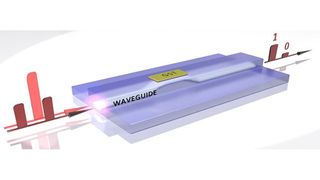All-optical chip memory just moved a huge step closer
Optical computers a reality?

Power supplies will one day be a thing of the past for long term data storage if a team of researchers from Germany have their way.
First reported by E&T, the world's first all-optical on-chip memory that can store data for huge periods of time without access to power has been developed by a team from the respected Karlsruhe Institute of Technology and a collection of other institutions from the UK and Germany.
It benefits from not just being limited to storing information in the usual ones and zeros and can store it in a range of different states.
What is it?
The technology used is based on phase-change materials that are able to swap between crystalline and irregular amorphous states incredibly quickly and this process alters the optical properties of the materials.
Switching between the two is integral to how the memory works. To store data the memory goes from crystalline to amorphous and the reverse process erases the data stored. Both are triggered by very short light pulses.
"Optical bits can be written at frequencies of up to a gigahertz," explained Professor Wolfram Pernice from the University of Münster. "This allows for extremely quick data storage by our all-photonic memory."
The invention is able to store millions of bits of data in a single cell that is a billionth of a metre in size and it even has the ability to perform autonomous calculations.
Are you a pro? Subscribe to our newsletter
Sign up to the TechRadar Pro newsletter to get all the top news, opinion, features and guidance your business needs to succeed!
Saving energy
"The memory is compatible not only with conventional optical fibre data transmission, but also with latest processors," Professor Harish Bhaskaran of Oxford University added.
Whilst the memory is still very much in its infancy, it's thought that in the future permanent all-optical on-chip memories could increase the performance of computers and ultimately cut down on their energy footprint.
Most Popular

